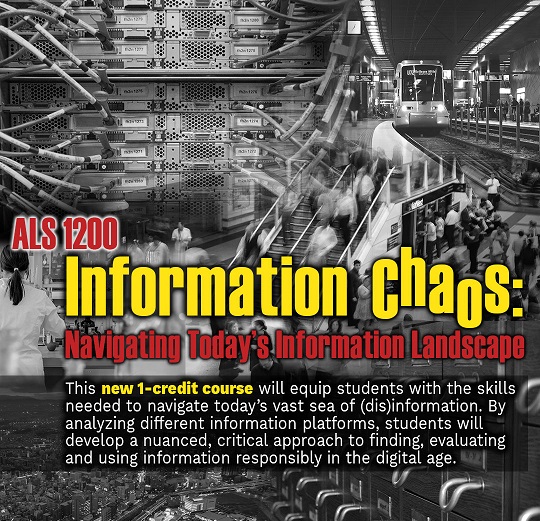In 1987, a weekday edition of the New York Times contained more written information than the average person was likely to encounter in a lifetime in seventeenth-century England. Imagine what we could say about the amount of information we encounter in our daily lives today–if you can! For a citizenry to be constructively engaged, it must be well-informed. Yet, as more information floods the information landscape, worrisome material also spreads, often quickly. What puts some information into the “worrisome quality” category? What makes it valuable? A new course led by librarian Ashley Shea, Head of Instruction Initiatives at Mann Library, aims to help students master these questions for a lifetime of success as critical thinkers, professionals and citizens.
This new 1-credit course will equip students with the skills needed to navigate today’s vast sea of (dis)information. By analyzing different information platforms, students will develop a nuanced, critical approach to finding, evaluating and using information responsibly in the digital age. Will meet on Fridays, 11:15 am – 12:05 pm.
1200, or “Information Chaos: Navigating Today’s Information Landscape,” will cover the theoretical, methodological and practical concepts and skills needed to understand and evaluate today’s vast information landscape. The course will focus primarily on information systems in the U.S., although several prominent examples of international information systems will also be included. At the end of this course, students will be able to:
- Compare various information types that exist and articulate the value(s) and problems(s) of each;
- Recognize the structural and ideological differences between various information systems (I.e., News sites, academic databases, federal repositories, etc.) that produce and disseminate information;
- Translate complex research questions into a search strategy with appropriate search tools and platforms;
- Apply various assessment tools to evaluate the credibility of information;
- Utilize citation management software to organize information conceptually and thoughtfully;
- Demonstrate understanding of attribution by properly citing the work of others.
Most of the readings and videos for this class will be open education resources (OERs) that are openly licensed and freely available online. In addition to assessing the quality of information available to researchers today, the topic of access to information will be an important component of this class. By making materials that are freely available to anyone regardless of location or means central to class assignments, the course will underscore this point.
As a 1 credit course, ALS 1200 will involve a final assignment: Students will be charged with creating an infographic that profiles a chosen information platform to effectively communicate its key features (scope, scale, history, financing, verifiability, transparency) for a broad but robust assessment of its quality as an information resource. We look forward to seeing what they come up with as newly minted pathfinders on the information frontier!
Visit ALS 1200 information & registration.
